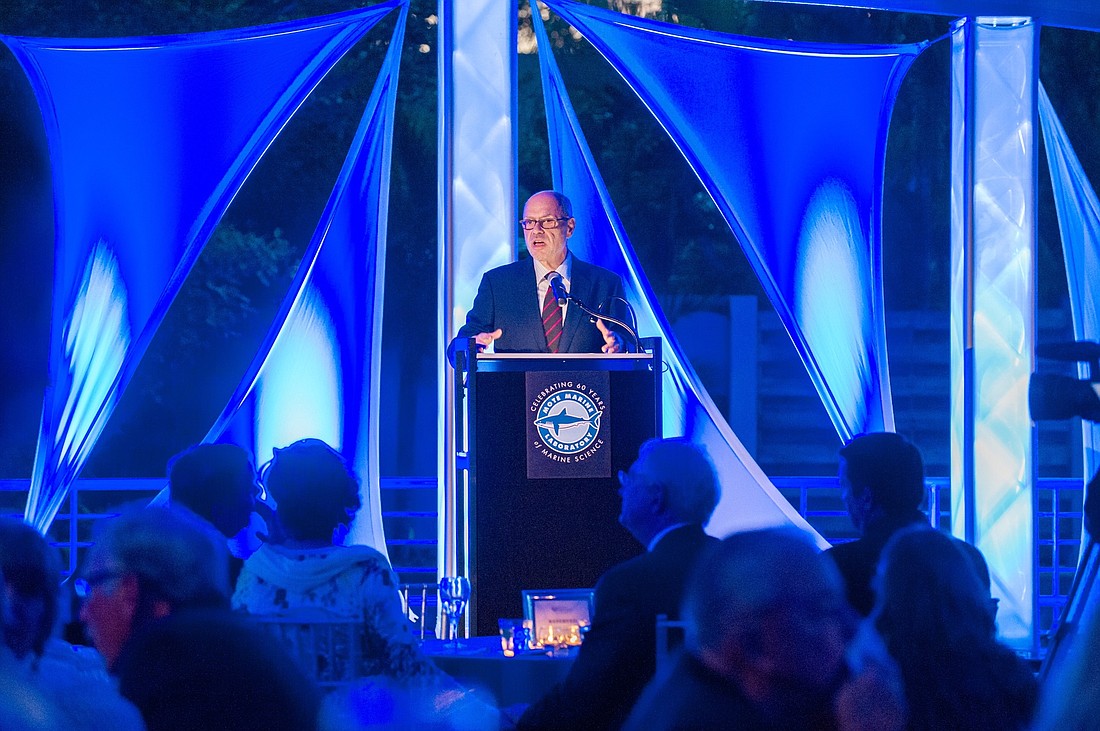- November 18, 2024
-
-
Loading

Loading

Last year, Mote Marine Laboratory and Aquarium announced a bold goal at its annual black-tie fundraiser, Oceanic Evening: Raise $50 million to expand the lab’s mission and impact through the Oceans of Opportunity campaign.
Mote announced Monday that it surpassed its $50 million goal late this summer.
The campaign was the first of its kind for Mote and will be a driving force behind Mote’s 2020 Vision and Strategic Plan.
“It’s exhilarating, it’s humbling, it’s exciting,” said Mote President and CEO Michael Crosby. “But I think the humbling piece is the biggest piece because when you think about it, to be able to secure the commitment from the community of such an enormous amount of support, it really does let you know just how important this community feels Mote is to the culture, to the way of life in this community and to how important the community feels the environment here is.”
Crosby said the campaign was needed to achieve Mote’s 2020 vision. The vision has four main priorities: expanding Mote’s global marine research program, drawing and retaining top marine scientists, using Mote’s science to impact conservation and sustainable use of the ocean, and giving back to the community in terms of service.
The only bricks and mortar piece of the campaign is the new facility being built on Mote’s Florida Keys property. However, in the distant future, Mote will be looking for an additional mainland campus that can be more accessible to more of the Sarasota community, Crosby said.
“As we grow our research enterprise, as we grow our education and outreach enterprise, we will need a new campus, an additional campus, and that is part of what the future will hold for us, and this campus here on City Island is something that is going to evolve over the next years,” Crosby said.
Raising $50 million wasn’t the only goal of the campaign. Another aim was to raise awareness of Mote as more than just a fun place to spend an afternoon.
Campaign Chairman Bob Essner said when people think of Mote, they think of its aquarium and its shark tanks and “touch me” stuff. Essner said they didn’t just ask for money, they told people to come look at the facility, tour the laboratories and meet the scientists.
“Not asking them for money, just saying, ‘Come see,’ with the belief, and I think it was a correct belief, that a lot of people would then find something that was of interest to them,” Essner said.
More than 23,000 people contributed to the campaign. Of those, 260 gifts were for $25,000 or more, 80 gifts were $100,000 or more, and 11 were more than $1 million. Donations came from every U.S. state.
“The research that Mote does needs to be funded by grants or philanthropy,” said G. Lowe Morrison, chairman of Mote’s board of trustees. “There is no giant pot of money at Mote that pays for research. All the research we do, our researchers apply for grants, and this percentage that comes from state and federal dollars has been dropping significantly, so more of that is from philanthropy and other dollars.”
Crosby points to the fact that 50% of donors were new donors as a sign of the campaign’s success.
“I had kids coming into my office literally giving me Ziploc baggies full of change and dollar bills that they were fundraising because they were passionate about the mission of Mote,” Crosby said.
Crosby is confident the $50 million will allow Mote to reach all of its goals, in part because he sat down with a pencil and piece of paper and calculated what each goal would take. He said when you look at the transitive research, such as the new techniques for coral reef restoration, or the marine immunology and marine microbiology programs that are developing potential therapies for 15 different types of cancer, the majority of the funding is philanthropic.
“This is what we have been about since our creation 61 years ago,” Crosby said. “It is enabling us to have the strength with which we can pursue new ideas, new initiatives that will have very positive impact to our oceans and to our communities.”
As one of the core priorities of the 2020 vision, the community has already been receiving some of the benefits of the campaign. Mote’s community engagement coordinator, Elaina Todd, works to form partnerships with Sarasota organizations that serve underrepresented populations in science to introduce them to Mote’s research and marine science concepts. Since she started in 2014, the number of partnerships has gone from two to 17.
“I think showing that we as an organization can reach this goal is only going to encourage future and continued support,” Todd said.